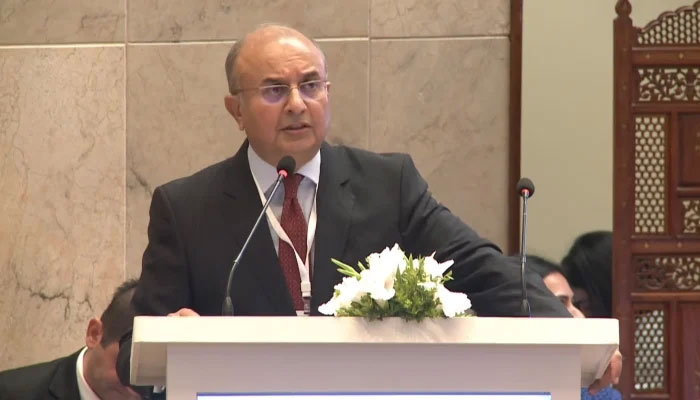26th Amendment also major issue like climate finance: Justice Mansoor
“Courts can push for stronger legal obligations for both domestic governments and international entities” says Justice Mansoor
LAHORE: Senior puisne judge of the Supreme Court Justice Mansoor Ali Shah said on Monday the 26th Constitutional Amendment was also a major issue like climate finance, and the courts keep issuing directives to the government and institutions.
He was speaking at the plenary session ‘Climate Justice: Legal and Policy Challenges in the Face of a Climate Emergency’ on the opening day of the “Pathways to Development Conference 2024” at LUMS here.
While stressing the importance of climate finance, the senior judge termed it the new human right that had to be examined and looked at in the context of climate justice. “Without climate finance, our right to life, which is enshrined in Article 9 of the Constitution, and our right to human dignity, which is guaranteed under Article 14, is under threat to our understanding,” Justice Shah said.
Justice Shah said that courts could recognise climate finance as a fundamental human right, stressing its necessity for survival and development of vulnerable communities by establishing a clear judicial understanding that climate finance was tied to the right to life, health and sustainable environment. “Courts can push for stronger legal obligations for both domestic governments and international entities,” he added.
The senior puisne judge referred to climate finance as funding drawn from local, national, or transnational sources, including public, private, and alternative financing, aimed at supporting adaptation efforts. He said that for a country like Pakistan, which was highly vulnerable to climate change, the availability of robust financial resources was critical. He added that climate finance supported adaptive measures like food defences, flood defence, drought resistant crops, sustainable urban infrastructure and community based disaster response systems. “Climate finance is not about helping, it is about restoring justice in a system that is fundamentally skewed against the Global South,” Justice Shah added.
About challenges vis-à-vis global climate funds, he said there were bureaucratic hurdles, stringent eligibility criteria, which countries like Pakistan could not meet and inequitable distribution as larger developing countries with better institutional capacities like India and Brazil often secured more funds leaving small and vulnerable nations behind. “If climate finance continues to fall short, the gap between developed and developing countries may grow leading to what now some people term climate apartheid,” he added.
Justice Shah stressed that climate finance was not merely an economic necessity but a moral imperative. It ensured that the most vulnerable, who had contributed the least to global emissions, have the resources to adopt, survive and thrive in the changing world.
About the Climate Finance Act 2017, the senior judge said the Act talked about national level climate fund, but despite the fact that the law was enacted in the year 2017, there had been no authority which could look at climate change in Pakistan as the apex body. He said that the Supreme Court had reached out to the government directing it to come up with an authority. Similarly, he said, considering that climate change was the most serious existential threat Pakistan was facing, there was no fund under the Climate Finance Act 2017 and nothing was allocated in the recent budget either, which was sad. The session was moderated by Maira Hayat from Notre Dame, while Saad Gulzar from Princeton also spoke.
-
 Princess Eugenie Breaks Cover Amid Explosive Family Scandal
Princess Eugenie Breaks Cover Amid Explosive Family Scandal -
 Will Kate And Anthony Have 'Bridgerton' Spin Off? Revealed
Will Kate And Anthony Have 'Bridgerton' Spin Off? Revealed -
 Schoolgirl Eaten Alive By Pigs After Brutal Assault By Farmworker
Schoolgirl Eaten Alive By Pigs After Brutal Assault By Farmworker -
 King Charles’ Statement About Epstein Carries A Secret Meaning: Here’s Why It Can Be An Invite To Police
King Charles’ Statement About Epstein Carries A Secret Meaning: Here’s Why It Can Be An Invite To Police -
 Demi Lovato Delivers Heartbreaking Message To Fans About Her Concerts
Demi Lovato Delivers Heartbreaking Message To Fans About Her Concerts -
 Sweden's Princess Sofia Explains Why She Was Named In Epstein Files
Sweden's Princess Sofia Explains Why She Was Named In Epstein Files -
 Activist Shocks Fellow Conservatives: 'Bad Bunny Is Winner'
Activist Shocks Fellow Conservatives: 'Bad Bunny Is Winner' -
 Noel Gallagher Challenges Critics Of Award Win To Face Him In Person
Noel Gallagher Challenges Critics Of Award Win To Face Him In Person -
 Minnesota Man Charged After $350m IRS Tax Scam Exposed
Minnesota Man Charged After $350m IRS Tax Scam Exposed -
 Meghan Markle 'terrified' Over Possible UK Return
Meghan Markle 'terrified' Over Possible UK Return -
 Did Opiate Restrictions Lead To Blake Garrett's Death?
Did Opiate Restrictions Lead To Blake Garrett's Death? -
 Royal Expert Reflects On Princess Eugenie, Beatrice 'priorities' Amid Strained Relationship With Sarah, Andrew
Royal Expert Reflects On Princess Eugenie, Beatrice 'priorities' Amid Strained Relationship With Sarah, Andrew -
 Prince William's 'concerning' Statement About Andrew Is Not Enough?
Prince William's 'concerning' Statement About Andrew Is Not Enough? -
 50 Cent Gets Called Out Over Using Slur For Cardi B
50 Cent Gets Called Out Over Using Slur For Cardi B -
 Scientists Discover Rare Form Of 'magnets' That Might Surprise You
Scientists Discover Rare Form Of 'magnets' That Might Surprise You -
 Nancy Guthrie’s Kidnapper Will Be Caught Soon: Here’s Why
Nancy Guthrie’s Kidnapper Will Be Caught Soon: Here’s Why




